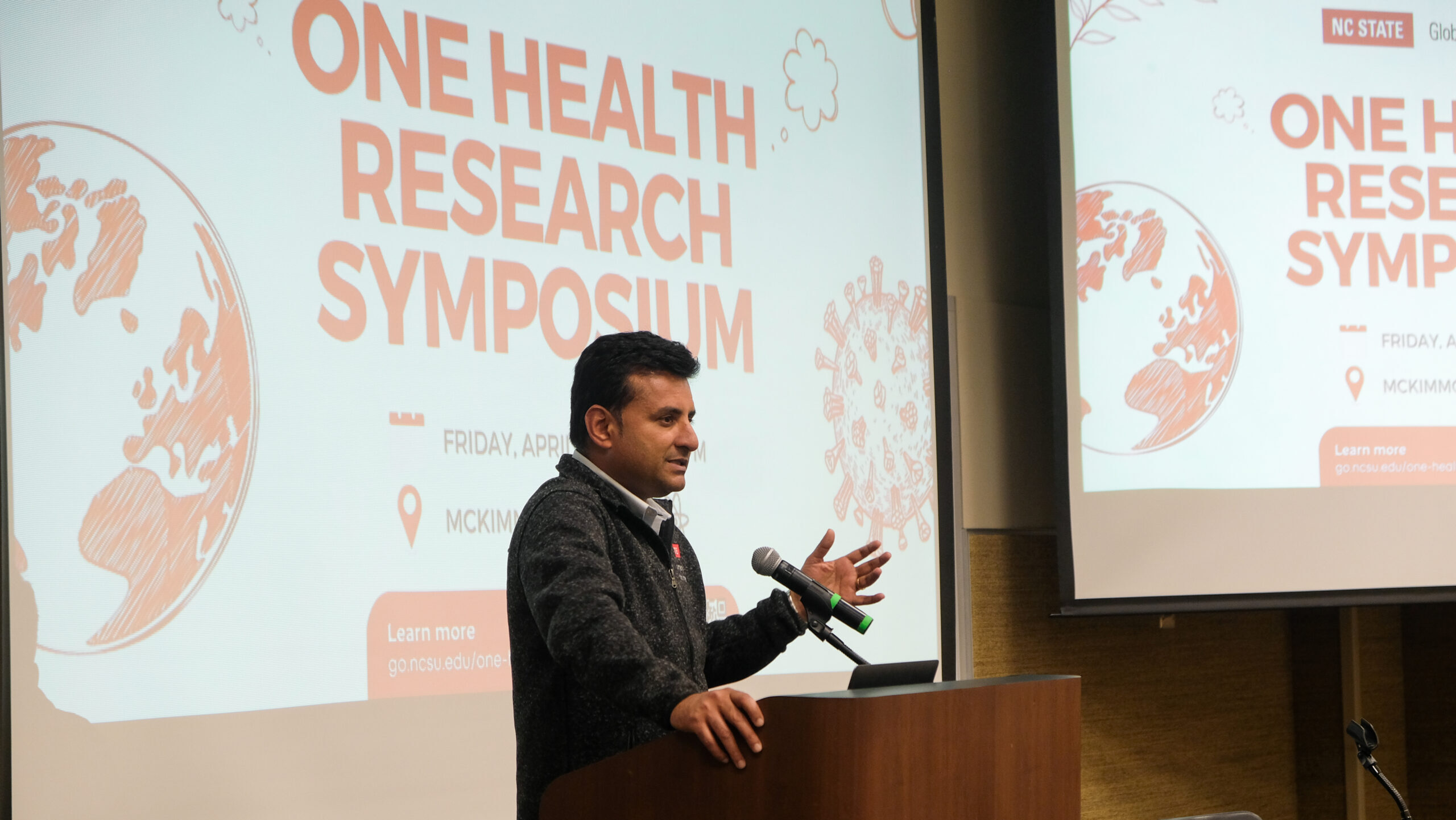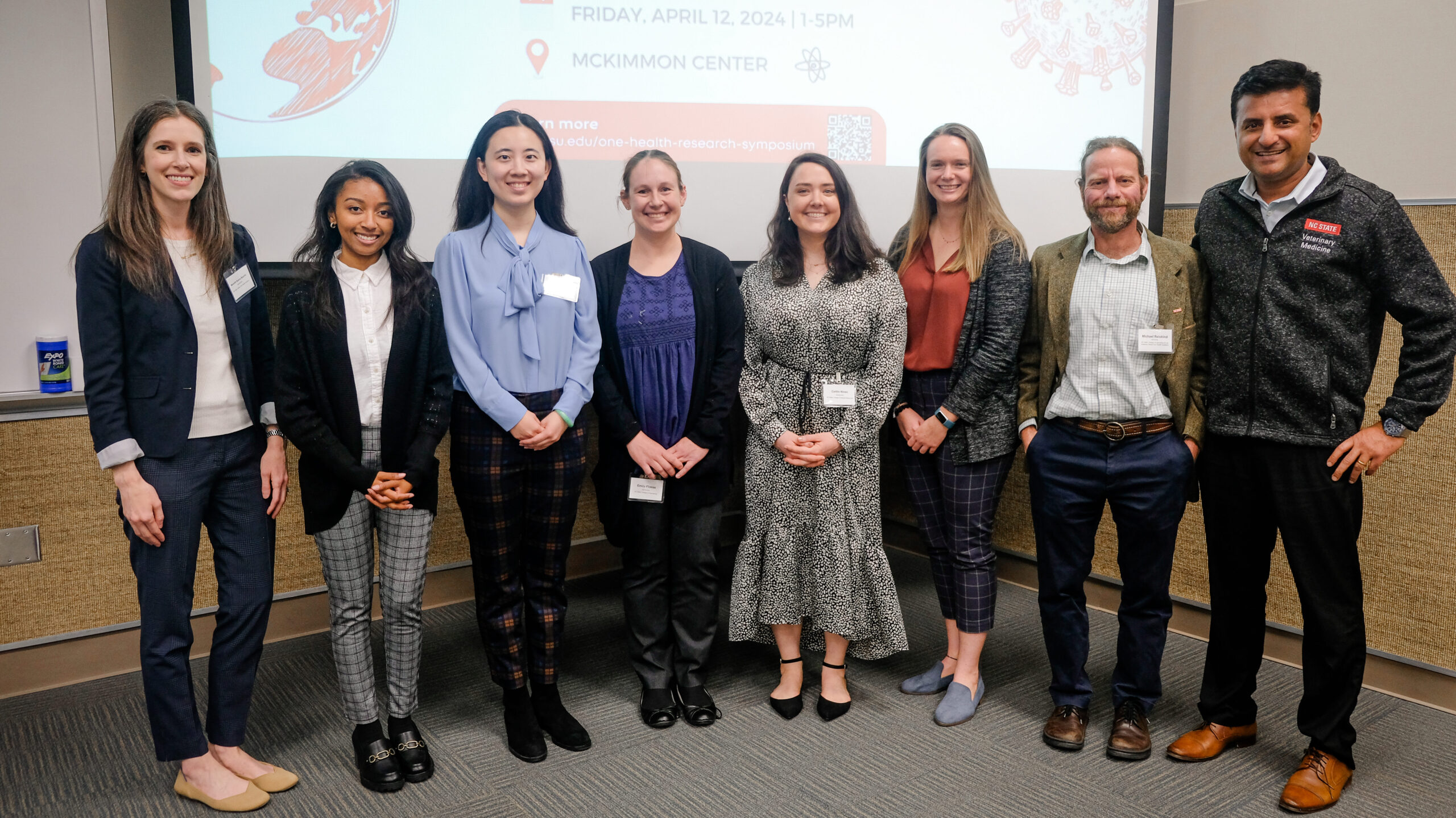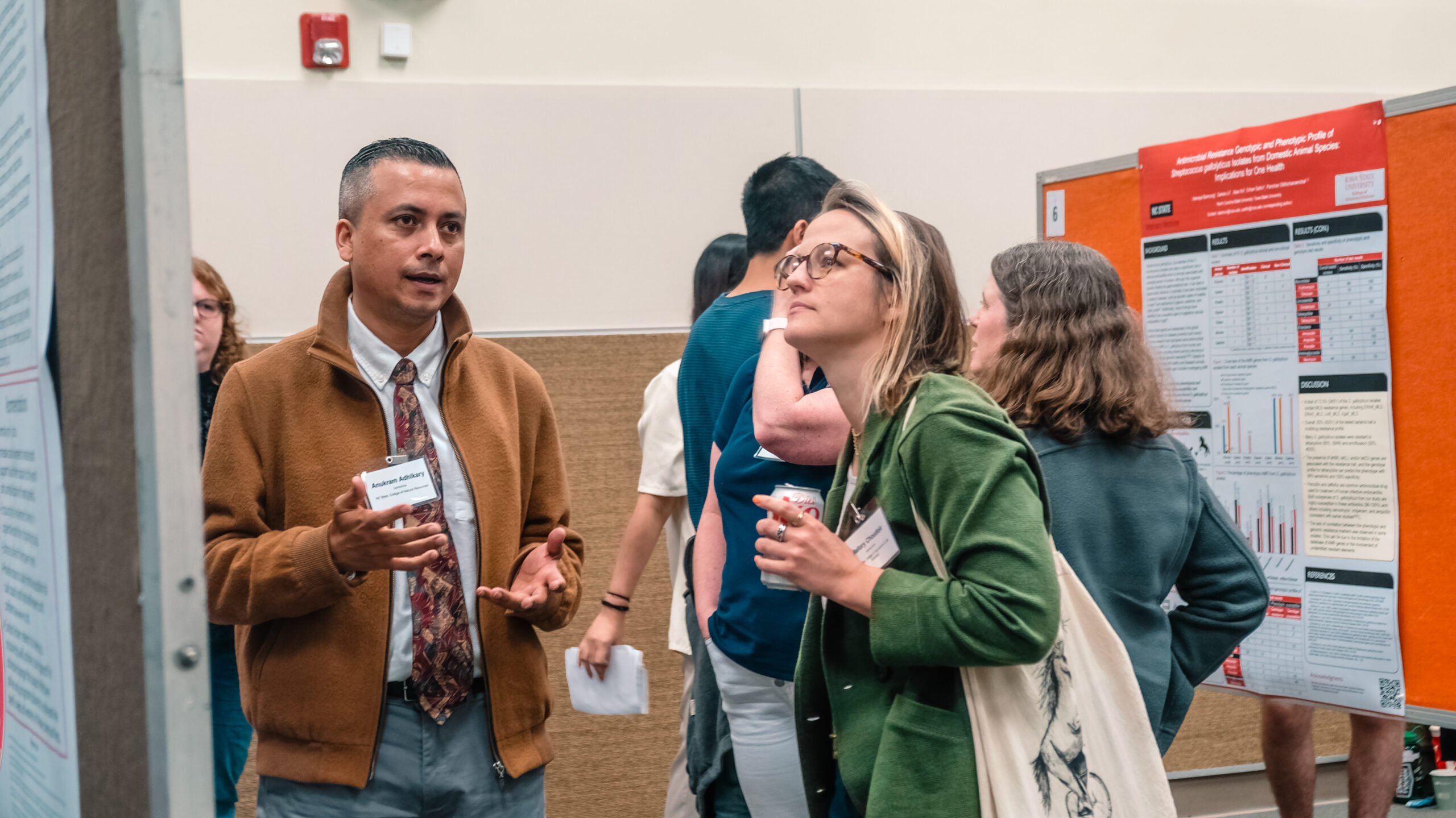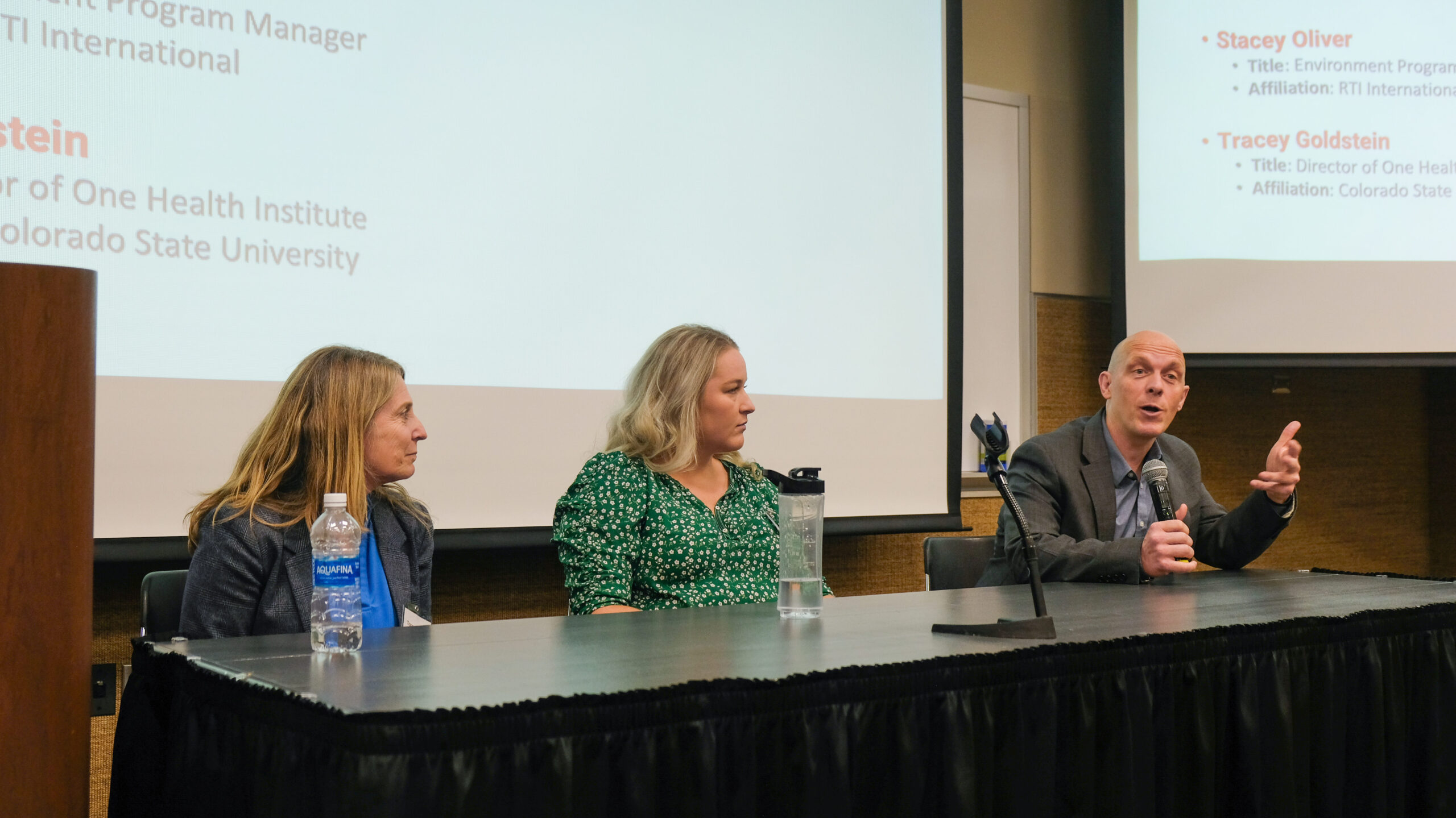An Afternoon of One Health Research & Engagement

Last week, the Global One Health Academy hosted its first One Health Research Symposium. This half-day event consisted of insightful One Health talks from three expert panelists, presentations from the Global One Health Fellows, and an engaging networking session.
On a sunny Friday afternoon, over 100 students, faculty, and staff from NC State and beyond convened at the McKimmon Center for GOHA’s first One Health Research Symposium. The event began with an introduction from GOHA’s Executive Director, Sid Thakur followed by an opening address from Rob Dunn, Senior Vice Provost for University Interdisciplinary Programs. Following opening remarks, the Global One Health Fellows presented their cutting-edge One Health research, and then attendees convened for an engaging poster and undergraduate job matching session. The second half of the event was marked by presentations from Stacey Oliver, Environment Program Manager at RTI, and Tracey Goldstein, Director of the One Health Institute at Colorado State University. Attendees were given the opportunity to pose questions to all three speakers during a robust panel discussion at the end of the symposium. The goal of this event was to spark excitement and spur academic conversation and new collaborations around One Health – a framework that recognizes the interconnected nature of plant, animal, human, and environmental health.
Global One Health Fellows Share Applied One Health Research

Caitlin Niven led off the Global One Health presentations with a talk on the effect of weather extremes on sanitation interventions and E. coli contamination in rural Bangladeshi households. Through her research, Niven has determined that proper sanitation interventions can reduce fecal contaminations during periods of higher rainfall intensities and higher temperatures. By reducing contamination of drinking water and food along with exposure to surface waters, intestinal infections can be controlled. Following this presentation, Savanna Smith shared her research into microbial community function and bacterial pathogen composition in pit latrines in peri-urban Malawi. She explained the One Health implications of this research, as zoonotic parasites can be transmitted through pit latrines and then spread through the surrounding environment via above-ground plant, below-ground soil, and nearby waterways.
Shifting to a social science perspective, Chenxing Xie then presented on the transnational risk communication of long COVID. Xie shared the recent history of long COVID legitimation in the U.S. and how this process involved communication shifts from patients to public and technical spheres. Emily Floess then presented on environmental health tradeoffs in low-income settings. She shared that indoor air pollution and lack of safe drinking-water supplies accounts for millions of premature deaths annually, and these issues are intertwined given the use of solid fuels for cooking and boiling water for consumption. Jade Lyons closed out the Global One Health Fellow presentations with a talk on gene editing for greener solutions. Lyons expressed how the growing global population puts increasing demands on the Earth’s resources. Fifty percent of Earth’s habitable land is used for agriculture and by 2100, humans could require 80% more food. Lyons research focuses on deploying genome editing to provide faster and more precise alternatives to classical breeding methods. This research can not only inform alternatives to the traditional genetically modified organisms (GMOs), but also provide solutions to meet the growing demands of an ever-changing world.
Networking Session Engages Students and Faculty

Following the Global One Health Fellow presentations was a poster session presenting the work of 14 students at the undergraduate and graduate levels. Five faculty with open undergraduate research positions also had booths where interested students could meet the researchers and express their interest in the positions. Undergraduate and graduate students used this session to share their outstanding global One Health research and network with faculty, staff, and other students from diverse disciplines.
Experts Share Knowledge & Experience in the One Health Space

During his opening address, Rob Dunn discussed the concept of mutualism in One Health. He expressed, “What global One Health can most offer us is relating to the rest of life, while maximizing mutual benefit.” He encouraged the audience to explore mutualistic relationships through the One Health framework, as inspired by ants, chimpanzees, and others. For example, ants have a mutualistic relationship with plants where 90% of plant nitrogen comes from ants and 18% of ant nitrogen comes from plants. Dunn challenged the audience to explore ways to effectively manage complex mutualisms by maximizing mutual benefits with the natural environment and beyond.
Stacey Oliver kicked off the second-half of the event with her presentation on RTI International’s vision for One Health. Oliver shared the current measures RTI is taking to ensure that governments are appropriately prepared for disease outbreaks, climate change, food-borne pathogens, and more. One of the ways to do this is through developing a well-equipped workforce in One Health proficient in public health, veterinary medicine, livestock, land management, border security, and conservation.
To continue the conversation on global One Health, Tracey Goldstein shared a presentation on implementing One Health to reduce risk and promote global health. Goldstein presented the concept of a One Health surveillance strategy consisting of concurrent sampling of wildlife, livestock, and people, detecting shared diseases, and investigating outbreaks. Goldstein displayed the interconnectedness between infectious disease outbreaks and their zoonotic origins, such as COVID, Ebolavirus, and Marburg virus. After the world was rattled by SARS-CoV-2, or COVID-19, support of One Health efforts and research has blossomed.
The symposium concluded with a robust panel discussion from these three speakers. Audience members asked the panelists about the futures of One Health and expressed a need for One Health research not just on the global scale but also on the local scale. By considering and understanding the connection human health has to plant, animal, and environmental health, we will be better equipped to manage the next emerging health threat.
Stay Tuned!
The Global One Health Academy’s inaugural One Health Research Symposium brought together scholars and students at all levels from NC State and other area universities with community practitioners to discuss the latest One Health research. At GOHA we strive to engage faculty, staff, undergraduate and graduate students in improving the health of plants, animals, biodiversity and human society in North Carolina and beyond. This symposium is just one of the ways that we honor and fulfill that mission. Stay connected with GOHA news and events for the chance to be involved in next year’s research symposium!
- Categories: